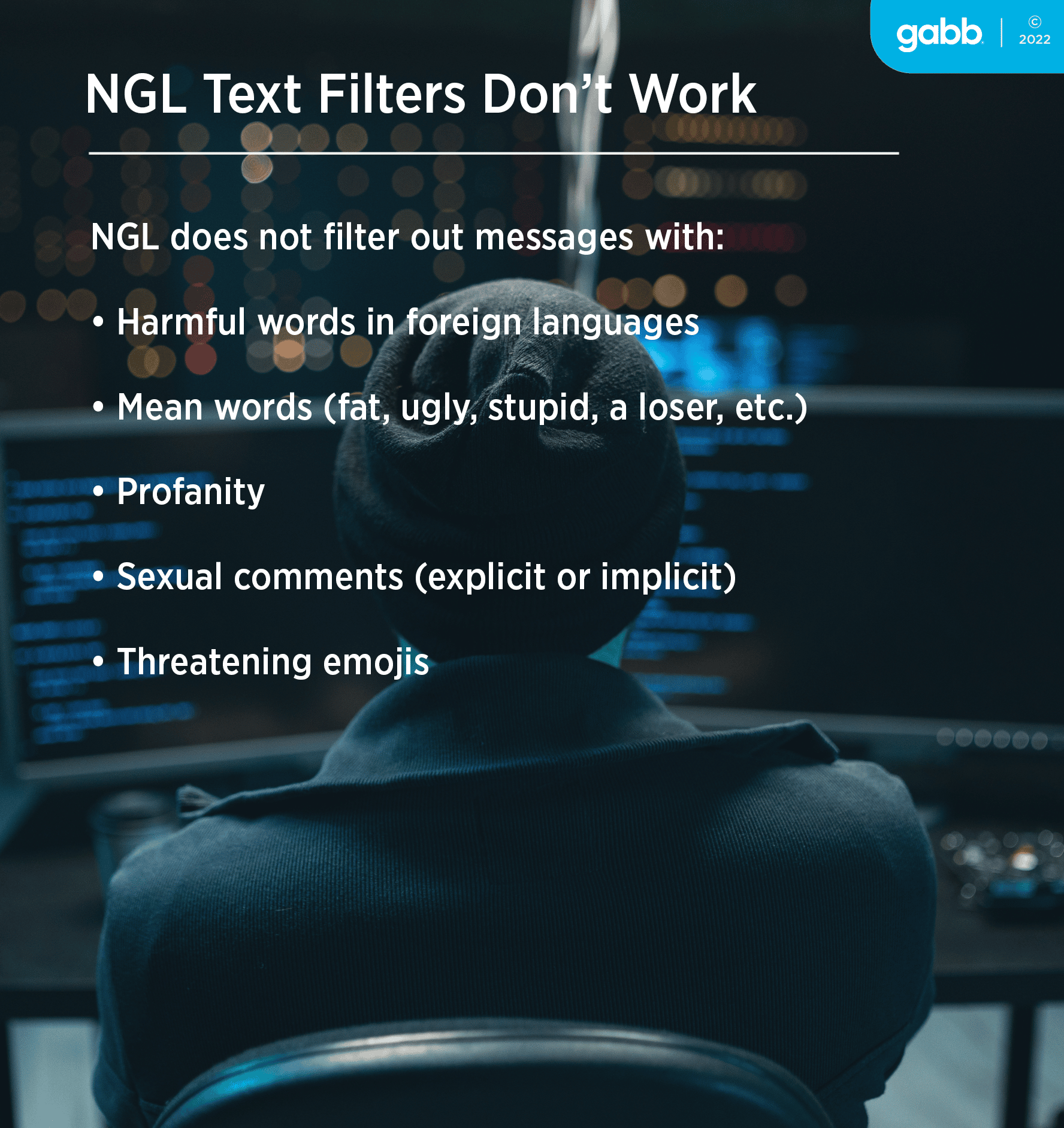What is NGL?
Learn why this anonymous social media app isn’t as safe for kids as it seems
AUG 18, 2022
What is NGL?
Learn why this anonymous social media app isn’t as safe for kids as it seems
Until the rise of digital technology, teenagers could only wonder what their peers really thought of them. Just over a decade ago, this changed.
These channels now allow followers to respond to a social media post without thinking about how comments may make someone feel.
Apps and websites like Formspring and Ask.fm created spaces for teens to ask questions anonymously and post their thoughts without fear of being identified or getting in trouble.
While anonymous social media platforms never completely disappeared, they are experiencing a recent surge in popularity.
The NGL app, in particular, has been downloaded more than 15 million times since it was released in December 2021. [1]
NGL’s homepage boasts that “anonymity only works if it’s safe.” [2] But how safe is NGL? Should you allow your child to download it?

What Is the NGL App?
NGL is a popular social media platform that acts as a personal inbox to receive anonymous messages from friends. The app is designed to work alongside Instagram but can also be used elsewhere.
The name originated from the texting slang term NGL, which stands for “not gonna lie.”

How Does NGL Work?
In short, using NGL is pretty straightforward.
First, users download the app and are asked to input their Instagram handle. Using this information, NGL creates a unique link for each user.
Users can then post links to their Instagram stories with captions like:
“Send me anonymous messages!” “Ask me anything anonymously,” or “Tell me what you REALLY think about me!”
Followers then respond by clicking on the link, typing a message, and hitting “Send!”
Users receive messages in their NGL inbox without knowing who sent them.
If your child’s Instagram account is public, anyone can send them a message saying practically anything.
Can you have a private conversation on NGL?
You cannot have a private conversation on NGL. The only way to reply to a message is to post it on your Instagram story.
After opening a message, users can select the “Reply” icon, which takes them back to Instagram to create another story featuring the original message and their response.
Since all their friends can see their story, replying is always public and validates the shared feedback.
It also creates the perfect storm for a knee-jerk reaction. If the comment is hurtful, it may seem reasonable to lash back out and share more than is wise.
While users can post their NGL link on any social media site, replies can only be made through Instagram.

Are messages really anonymous on NGL?
While messages are anonymous, users can pay for a subscription to receive “hints.”
Hints are unspecific, so it’s unlikely you can guess the sender from them.
Hints include the time and place the message was sent as well as the type of phone and IP address used.

Is NGL Safe for Kids?
Though it seems innocent enough, NGL presents several dangers to kids.
In addition to requiring an Instagram account, which comes with its own set of risks, NGL’s biggest dangers are its potential use by cyberbullies and the way it encourages young people to obsess about what other people think of them.
Cyberbullying on NGL
Since their conception, anonymous sharing apps have caused parents concern.
Kids saying anything they want without fearing any consequences? It’s a recipe for cyberbullying disasters.
In March of 2022, Snapchat banned these types of apps on their platform after facing lawsuits from parents of children who had died by suicide after being cyberbullied. [3, 4]
Children’s Hospital of Philadelphia and the University of Pennsylvania researchers found in its study of 10,000 10- to 13-year-old American children that cyberbullying was a greater risk factor in suicidal thoughts than offline bullying.
—Iain Martin, Forbes Magazine
With the potential for danger, NGL touts its ability to create a kid-safe experience through its “world-class AI moderation.”
According to their website, this filters out harmful messages or bullying. Unfortunately, the filter doesn’t live up to NGL’s hype.
While it won’t allow for blatantly harmful messages like “Go kill yourself,” it does not filter out less explicitly dangerous rhetoric like “Everyone hates you,” “You’re fat and ugly,” or “I think you’re a loser.” [4]
The AI moderation also allows users to send profanity, threatening emojis (like knives), and sexual messages.
The filter does not block users who have previously sent mean messages. Bullies have unlimited chances to try and hurt people they know.
NGL feeds insecurities
Even if NGL could filter out bullying and explicit language, it would still be unhealthy for teens to use.
The underlying concept—receiving anonymous messages about what your peers think of you—feeds insecurity and focuses teens on themselves.
In turn, this leads to an increase in mental health problems, lack of self-esteem, and lower life satisfaction. [5]
Even if NGL could filter out every instance of bullying or explicit language, it would still hurt teens by encouraging them to obsess over what their peers think of them.

Don’t Just Say No
Teenagers naturally want to know what their peers think. This curiosity is what makes NGL so popular.
Instead of telling our kids they can’t use the app, explaining why it isn’t a good idea will provide a great learning moment.
Prepare for pushback! When a kid wants an app, they are relentless. Know that other parents are facing the same challenge.
As a parent, you know what is best for your child. Let them know the answer isn’t never, just not yet.
Talking to Kids about Apps
Teens who have NGL can gain some insights into themselves by discussing the messages they have received and how they feel about them.
Tough conversations like these give kids a chance to consider whether the app increases or decreases their life satisfaction.
Questions To Start Conversations
- Why do you think it is dangerous to be too concerned with what others think about you?
- How might this app be dangerous for your younger siblings or friends? Do the same dangers apply to you?
- What does this app focus its users on? Why might this be problematic?
- What are some reasons people would use this app? What are healthier alternatives to achieve the same ends?
Educating kids about cyberbullying and the dangers of obsessing too much about other people’s opinions can help.
Parents can also encourage their children to build healthy relationships with others—fostering emotional security, self-confidence, and self-acceptance rather than the scrutiny that can be found on NGL.
Words of Wisdom to Share:
No one can make you feel inferior without your consent. —Eleanor Roosevelt
Be who you are and say what you feel, because those who mind don’t matter, and those who matter don’t mind. —Dr. Seuss







Success!
Your comment has been submitted for review! We will notify you when it has been approved and posted!
Thank you!